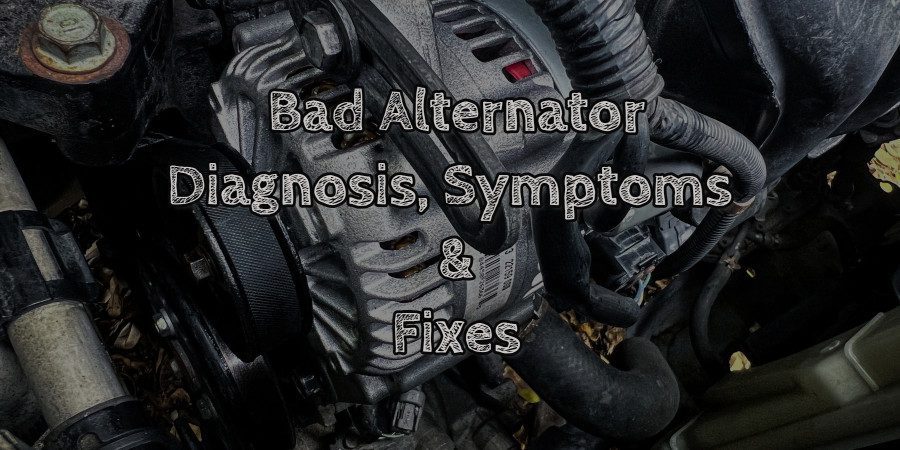
How To Check A Bad Alternator
It is a common belief that the battery powers the electric components in your car. This is not the case. The battery provides power to start the engine but only continues to run it for a little while. Once the engine starts and runs, the battery leaves and the alternator takes over.
It is the alternator that powers the electricals as you drive. It also charges the battery as you drive to ensure it has enough juice to start the engine again when you stop and start again.
The battery only powers electricals when the engine is off.
How the alternator makes electricity
The alternator is made up of 4 main components.
- A voltage regulator
- The stator
- The rotor
- The diode
When the battery first powers the car, the alternator belt (V-belt) spins a pulley, making the rotor spin at high speed. A rotor is a group of magnets encased in copper wires known as the stator.
The process in which magnets spin along a set of copper wires at incredibly high speed generates electricity.
It is called electromagnetism. Electricity produced travels through the copper wires to a diode which then converts it from AC (alternate current) to DC (direct current), which is the form in which the battery utilizes it.
The final step is in the voltage regulator, which is a gatekeeper. It restricts the power flow to the battery when the voltage rises beyond 14 ½ volts. This ensures the battery doesn’t overcharge and burn out.
As soon as some power from the battery is drained, the voltage regulator allows more power from the alternator and then cuts it off when the battery is fully charged.
Electricity produced is used to power components such as headlights, dashboard lights, power windows, and the radio.
Signs of a Failing Alternator
Alternators rarely break down suddenly. They usually start to show signs of an eminent breakdown shortly. You will probably notice warning signs well in advance. Some common signs that your alternator is dying include:
Difficulty starting: The battery provides energy used to crank up the motor. How does a faulty alternator cause starting problems?
It is because the alternator replenishes the battery’s power, so if it doesn’t replenish it sufficiently, it lacks sufficient power to start the engine.
The battery is usually the first suspect when your car doesn’t start as it should. Don’t forget to check the alternator as well.
Failing electrical components: It may not be as obvious as failure to start the engine, but it gets more obvious as the alternator gets weaker.
At first, you may imagine that you noticed the headlights get dim, then the dashboard lights also start to dim. Next, you notice that the power windows are still working but seem to drag as the window rolls up. If nothing is done, these components eventually fail.
Growling noise: The alternator is driven by a crankshaft pulley which works alongside a belt. The alternator pulley spins at an extremely high speed to produce power.
The alternator produces growling noises when the pulley and belt are misaligned, as often happens with age. It may also happen when bearings are worn out.
Burning rubber smell: When the belt and pulley are misaligned, excess friction may produce a burning rubber smell. If wires in the alternator are scorched, a similar smell may be produced.
The warning light comes on: In some vehicles, the ALT or GEN light in the instrument panel comes on when there is a problem with the alternator.
Causes of a Bad Alternator
These are some common reasons behind a faulty alternator
Worn-out alternator: A typical alternator lasts between 5 and 7 years. If your alternator fails and has served you for about this period, it is time to let it go. It has done its time, and a replacement is due.
Damaged wires: Energy produced is delivered to the alternator via wires. If one or some of these wires are damaged or worn out, the alternator does not function as it should, even though it is in good condition. When the alternator fails, the battery is uncharged and lacks sufficient power.
Make a point to check all the wires feeding the alternator to rule out this possibility. If it is indeed a damaged wire, this is a quick fix.
Computer system failure: Modern cars come with an in-built computer system that is responsible for managing virtually all vehicle components, including the alternator. When there is a problem with the computer system, the alternator may fail to work even if it is in good condition.
It will probably be easy to identify a computer-related problem because failures will arise in other computer-controlled components. You will probably need a professional technician to fix car computer problems.
Blown a fuse: Alternators use fuses to work. Like all other fuses, these blow out after continued use. If the alternator fuse blows, it doesn’t recharge the battery. To fix this, replace the fuse.
What makes an alternator fuse blow? Like all other fuses in electric circuits, this fuse is placed in the alternator designed to melt and separate into two pieces in the event of excessive current. If there is a power surge, the fuse blows.
Another reason the fuse could blow is if the current demands placed on it are more than it can support. If, for instance, you have a dead battery so you jump start the car and then switch on many electric components as you drive, such as lights, air conditioner, and entertainment system.
Can A Bad Alternator Ruin A Car Battery?
The short answer is yes. A bad alternator can kill a battery. However, it depends on a few factors. To understand how this happens, it is necessary to understand how the car battery, which is constantly recharged by the alternator, works.
Some types of batteries are designed to discharge fully, while others are designed such that they should always have some charge in them. Car batteries fall in the latter category.
How car batteries work: Inside the battery is a pair of lead plates suspended in a bath of sulphuric acid, the electrolyte. The plates are coated with lead sulfates every time the battery is used.
This sulfation process is reversible when the alternator recharges the battery.
If, for some reason, the battery is excessively discharged, lead sulfate crystallizes. When it does, even recharging cannot reverse sulfation. Lead sulfate crystals remain on the plates. This causes a permanent reduction of the output of the battery.
When does a bad alternator completely kill a battery, and when does a battery survive a bad alternator? It depends on
- How far was the battery discharged after the alternator failed? How long did you drive on battery power only? The longer it runs, the higher the chances it will die.
- The age of the battery. If it is a fairly new battery, you can get away with it once or twice.
- How long has the alternator been ailing? If it had been ailing for a long time, it probably suffered improper charging for some time. The day the alternator dies completely, and the battery is deeply discharged, it may be too weak to survive the strain.
Tips on Dealing with a Bad Alternator
Can you jumpstart a car with a bad alternator?
Yes, you can jumpstart your car even if the alternator is dead. Chances are the battery is dead because the alternator didn’t charge it enough. Even then, rarely would a battery be completely dead. It doesn’t have enough power to crank the engine (which is a lot), but it can be charged and provide enough power to get you to the repair shop.
If you decide to do this, perhaps to save on towing costs, ensure the person who helped you jumpstart your battery follows you to the mechanic, especially if it is more than a few miles away.
Does a bad alternator affect the air conditioning system?
Yes, the air conditioning system will not work if the alternator is faulty. Air conditioning systems are among several components such as the radio, power windows, lights and engine powered by the alternator.
How to differentiate between battery and alternator problems
For many drivers, when the car won’t start, it is assumed that there is a problem with the battery. While battery failures are common, they could also be caused by a bad alternator. How can you determine which of the two is to blame?
The answer takes a good understanding of how the two work together, and which part does what. After that, it is pretty much a game of elimination.
First, get your hands on a set of jumper cables and a car with a good battery and jump-start the car. Once the car is running, remove the positive battery cable.
If the car suddenly stops running, you know you have a bad alternator. If it keeps running, you have a bad battery.
Alternatively, check the voltage of the battery using a voltmeter. With the car running, check if the voltage rises as you increase engine speed. If the voltage remains the same, you have a bad alternator.
How long does an alternator last?
If your alternator starts giving you trouble after a couple of years of use, it may just be that it has served for its expected lifespan. Alternators are designed to last between 100,000 and 150,000 miles, translating to about 7 years.
However, most drivers don’t get to use alternators for that long. Mechanics say they often see alternator failures after about 80,000 miles. Why the difference between design and actual experiences?
It depends on the workload you place on your alternator. If you ordinarily have many electric components running in your car, it reduces the overall lifespan of the alternator.
Conclusion
When you hop into your car, and turn the key, but the engine won’t start, your first suspicion will be the battery. However, it could very well be a problem with the alternator. Alternators could fail due to old age, a blown fuse, or damaged wiring.
Check the battery and alternator at least once a month to ensure they are both in good condition and to catch any problems before they cause any problems.
FAQs
Some people’s alternators last longer than others. What can I do to make mine last as long as it can?
You could take some measures to prolong your alternator’s life. First check posts and cables leading to the battery are free of corrosion. It ensures charge travels freely and easily.
Secondly, habitually check the drive belt, which loops around the rotor shaft. This way, you will catch signs of deterioration early and prevent more extensive damage.
How can I replace an alternator fuse?
The actual replacement of an alternator fuse is very easy. The challenge is in finding the one which needs to be replaced. A typical car fuse box can have up to 30 fuses for different components making it difficult to identify the one for the alternator. Use the owner’s manual as a guide.
Actual replacement takes sliding the old one out of place and sliding the new one into position.
What should you do if the alternator dies while driving?
If the alternator dies while you are driving, you will first notice that headlights and dash lights go dim and then go off. The best thing to do is turn off all components, such as the radio and air conditioning and drive to the nearest repair center. Pull over safely if you can’t get that far and call for towing assistance.
Can I replace the alternator myself?
If you have some basic mechanical know-how you can save yourself a few hundred dollars and replace the alternator yourself. You will need basic tools and something to help you remove the belt.
